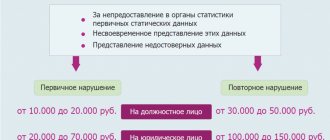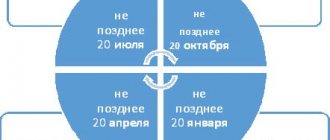Briefly about the history of the taxation system in Russia
The tax system of the Russian Federation began to take shape after the collapse of the USSR, namely in December 1991.
Then the law “On the Fundamentals of the Tax System of the Russian Federation” was adopted. He introduced new taxes and fees, for example, VAT, income tax, excise taxes on alcohol and tobacco products and others. In 1998, the 1st part of the Tax Code of the Russian Federation was approved, in 2000 - the 2nd part. This code has become the main legislative act in the Russian tax system. The Tax Code of the Russian Federation determined the relationship between the state and taxpayers, the structure and elements of the Russian tax system. Separately, it is worth highlighting the formation of state bodies to supervise taxation in the Russian Federation. In 1990, the State Tax Inspectorate was created, which was then transformed into the State Tax Service. In 1998, the Ministry of Taxes and Duties appeared. In 2004, it was reorganized, and its functions were transferred to the Ministry of Finance of the Russian Federation. From the same year, the well-known Federal Tax Service began to function, which continues to operate to this day.
The tax system is... (concept and structure)
The tax system of the Russian Federation can be defined as the totality of all taxes and fees adopted in Russia, as well as administrators of taxes and fees (government bodies) and their payers.
The structure of the Russian tax system implies a complex interaction of all its constituent elements: taxes (and, since 2017, also insurance) and fees, their payers, the legal framework and government bodies.
The structure of the tax system of the Russian Federation has 3 levels:
- federal;
- regional;
- local.
The tax level determines the corresponding budget level to which it is credited.
Since the tax system of the Russian Federation has a 3-level structure, the legislative framework on taxes and fees is also divided into 3 levels:
- Federal legislation is the highest level of the legislative framework. It operates throughout the Russian Federation. By-laws and other normative legal acts must not contradict it. This category includes both parts of the Tax Code of the Russian Federation, federal laws that are consistent with the provisions of the Tax Code of the Russian Federation, decrees of the President of the Russian Federation, resolutions of the Government of the Russian Federation and, of course, the Constitution of the Russian Federation.
- Regional legislation includes the laws of the constituent entities of the Russian Federation on taxation in a specific region of our country.
- Local legislation consists of normative legal acts that are adopted by representative bodies of local government (councils of deputies, legislative assemblies).
Research staff of Nizhny Novgorod State University named after. N.I. Lobachevsky conducted a study assessing the risks and effectiveness of various tax systems at different levels of the budget system. You can get acquainted with the conclusions of Doctor of Economic Sciences M. Yu. Malkina and her assistants in ConsultantPlus. If you do not have access to the K+ system, get a trial online access for free.
In addition, on the basis of the Tax Code of the Russian Federation, the Ministry of Finance of the Russian Federation and the Federal Tax Service of the Russian Federation develop orders, clarifications, clarifications, letters and other similar documents. They are necessary to specify the provisions and articles of the Tax Code of the Russian Federation and other federal laws of the Russian Federation in the field of taxation. Such documents clarify situations that are unclear from the point of view of taxpayers and can be drawn up on the basis of their requests.
Read more about federal, state and local taxes in this article.
Elements of the tax system of the Russian Federation
As noted earlier, the tax system of the Russian Federation involves the interaction of all its elements and an integrated approach to solving tax problems. All constituent elements form the tax structure of the Russian Federation.
The structure of the Russian tax system includes:
- all taxes, insurance premiums and fees accepted on the territory of our country in accordance with the Tax Code of the Russian Federation;
- subjects of taxes and fees;
- regulatory framework;
- government authorities in the field of taxation and finance.
Now let's look at each element of the Russian tax system in more detail.
Taxes and fees established in Russia are obligatory for those categories of taxpayers who are responsible for their payment in accordance with the provisions of the Tax Code of the Russian Federation. The concept of tax and fee is defined in the Tax Code of the Russian Federation.
The subjects of taxation are taxpayers (legal entities and individuals) and tax agents, that is, those who, according to the Tax Code of the Russian Federation, pay taxes and fees. As an example of tax agents, we can cite enterprises and organizations that calculate and transfer personal income tax on the accrued income of their personnel, and also submit the corresponding tax reports (2-NDFL, 6-NDFL) after the end of the tax period (year).
The system of tax authorities of the Russian Federation includes:
- Ministry of Finance of the Russian Federation.
- Federal Tax Service of the Russian Federation.
The Ministry of Finance of the Russian Federation determines the main directions of the tax policy of our state, forecasts tax revenues and makes proposals for improving the tax system of the Russian Federation as a whole. His department includes the Federal Tax Service of the Russian Federation as an executive body of state power.
The main functions of the Federal Tax Service of the Russian Federation are:
- accounting of taxpayers and fees;
- control over compliance with tax legislation requirements;
- supervision and verification of tax accruals, their payment to the relevant budget and tax reporting.
Read about tax audits in our section of the same name “Tax Audits”.
The Federal Tax Service of the Russian Federation is a unified system of all tax authorities. The unified centralized system of tax authorities consists of:
- Management in each subject of the Russian Federation. The territorial tax authorities and inspectorates of the Federal Tax Service of the Russian Federation are subordinate to him.
- Interregional inspections of the Federal Tax Service for each federal district. Subordinate to them are interregional inspectorates for the largest taxpayers, for centralized data processing (DPC), as well as interdistrict inspections.
Features of ORN
All organizations and individual entrepreneurs that decide to choose ORN must first familiarize themselves with its regulatory framework, as well as its features. This will help you finally decide which system is best to choose for each individual enterprise. Otherwise, there is a high risk of errors in reporting, which may later cause problems with the tax service.
ORN is a set of tax procedures defined by the regulatory framework of the Tax Code. All tax assessments are subject to payment by companies, individual entrepreneurs, and individuals.
If an enterprise has decided which form of tax system to choose, and it turns out to be ORN, you need to know its nuances. The main nuance of the work here is the need to organize accounting through the double entry procedure. Moreover, the Chart of Accounts must be used for the financial and economic activities of the organization. You must also comply with the requirements specified in the following documentation:
- provisions related to accounting/accounting in the Russian Federation;
- Federal Law “On Accounting”;
- standard recommendations developed by the Ministry of Finance of the Russian Federation dated December 21, 1998 No. 64n;
- PBU.
The question here is not which document is better to choose; you need to adhere to all of them in your commercial activities.
According to standard recommendations, a small enterprise and individual entrepreneur, when carrying out income and expense accounting, can use a cash algorithm or an accrual algorithm. Each organization decides for itself which form is best to choose. It is worth noting here that the selected algorithm must be recorded in the accounting documentation.
At the same time, small organizations are required to prepare financial statements every quarter. It is better to be guided by the Tax Code of the Russian Federation in this matter.
What are the taxes in the Russian Federation?
In total, there are 14 taxes in our country: 8 federal, including state duty, 3 regional and 3 local. There are 5 special taxation systems that stand a little apart. We will also highlight insurance premiums and the new experimental taxation regime for self-employed persons, introduced in 2021.
Read more about the experiment on taxation of the self-employed here.
Federal taxes throughout the territory of our state have the same tax rates, calculation rules and transfers in accordance with the Tax Code of the Russian Federation. These include:
- personal income tax;
- corporate income tax;
- VAT;
- excise taxes;
- water tax;
- mineral extraction tax;
- state duty.
Special tax systems also fall into this category: simplified tax system, UTII, product division, unified agricultural tax and PSN (patent).
Regional taxes are also approved by the Tax Code of the Russian Federation at the federal level. Regional authorities have the opportunity to change taxation conditions at their discretion and within the limits adopted by the Tax Code. For example, regions can set a tax rate, but not more than the amount prescribed in the Tax Code of the Russian Federation. All changes are fixed by the laws of the constituent entities of the Russian Federation. This includes transport tax, gambling tax, and corporate property tax. Regional government bodies can also introduce special tax regimes and make their own changes to them, but in accordance with the provisions of the Tax Code of the Russian Federation.
Local taxes, however, like other taxes and fees in Russia, are also approved by the Tax Code of the Russian Federation. Local self-government bodies can make changes and additions to them within the framework of the Code. Local taxes include:
- land tax;
- property tax for individuals;
- trade fee.
Depending on the manner of collection, taxes can be divided into 2 main categories: direct and indirect. Direct taxes are charged directly on the income or value of the taxpayer's property. Indirect taxes are included in the cost of goods, services and works. In fact, they are paid by the buyer of the product, and the seller acts as an intermediary between the indirect tax and the state. In the Russian Federation there are only 2 indirect taxes: VAT and excise taxes. All others are direct.
For more information about direct and indirect taxes, read the article “What taxes are classified as direct and indirect (table)?”
Taxes paid by all organizations and entrepreneurs if there are objects of taxation
All organizations and entrepreneurs are required to pay a number of taxes, regardless of the tax regime they apply. However, this obligation arises only if there is an object of taxation with the corresponding tax and the taxpayer does not have benefits.
Land tax
Taxpayers: organizations and individuals owning land plots recognized as an object of taxation in accordance with (Article 389 of the Tax Code of the Russian Federation).
Privileges:
- reduction of the tax base (Article 391 of the Tax Code of the Russian Federation);
- preferential tax rate (Article 394 of the Tax Code of the Russian Federation);
- exemption from payment (Article 395 of the Tax Code of the Russian Federation).
Municipalities can establish additional benefits on their territory.
Deadline for submitting the declaration : no later than February 1 following the reporting year.
Payment of tax is at the location of the land plots.
The deadlines for payment of land tax and advance payments thereon are established by the laws of municipalities.
Entrepreneurs are taxpayers only if they use land owned by them in business activities. If an individual is an individual entrepreneur, but does not use the land in business activities, then a declaration is not submitted, and the tax is paid on the basis of a tax notice sent by the tax authority.
Transport tax
Taxpayers : persons on whom vehicles are registered, recognized as an object of taxation (Article 358 of the Tax Code of the Russian Federation).
The following are not subject to taxation : transport of agricultural producers, as well as passenger and cargo watercraft and aircraft that are the property of legal entities or individual entrepreneurs whose main activity is transportation.
Deadline for submitting the declaration : no later than February 1 following the reporting year. Tax returns are submitted only by taxpayers - organizations.
The deadline for payment of transport tax is established by regional laws.
Individual entrepreneurs do not submit a tax return regarding transport tax; the tax is paid on the basis of a notification from the tax office.
Water tax
Taxpayers : organizations and individuals engaged in special water use, in the form of water intake from water bodies or the use of their water area.
Tax return submission deadline: no later than the 20th day of the month following the reporting quarter.
payment deadline is no later than the 20th day of the month following the reporting quarter.
The extensive list of situations of water intake or use of water areas specified in Article 333.9 of the Tax Code of the Russian Federation, such as water intake for irrigation of agricultural land, use of water areas for fishing and hunting, for the placement and construction of hydraulic structures, etc., is not subject to taxation under the water tax.
Excise taxes
Excise tax is an indirect tax that is included in the price of a product and is actually paid by the final buyer (consumer). Excise taxes are paid by both organizations and entrepreneurs who are producers, processors or importers of excisable goods, which, in particular, include:
- alcohol-containing products, with the exception of medicines, cosmetics and perfumes;
- alcoholic products, including beer;
- tobacco products;
- cars;
- motorcycles with power over 150 hp. strength;
- motor and straight-run gasoline;
- diesel fuel and motor oils.
The list of excisable goods is determined by Art. 181 Tax Code of the Russian Federation
The tax period for excise taxes is a calendar month.
The declaration is submitted no later than the 25th of each month (based on the results of each previous month).
Payment of excise taxes : no later than the 25th day of the next month.
Payers of excise taxes on transactions with denatured alcohol and straight-run gasoline: submit declarations and pay excise taxes no later than the 25th day of the third month following the reporting period.
Types of taxation systems in the Russian Federation: basic, simplified taxation system, UTII, etc.
Choosing a taxation system in Russia for business entities is an important event that allows you to determine the tax burden for business. Let's look at the main types of taxation in Russia.
The tax system of the Russian Federation includes 5 tax regimes plus another experimental one (from 2021):
- Basic taxation system (OSNO).
This mode is assigned to a business entity automatically immediately after registration with the Federal Tax Service. It can be used by both LLCs and individual entrepreneurs. The taxpayer has the right to switch to a special regime subject to compliance with the conditions established by tax legislation.
- Simplified taxation system (USNO).
The simplified tax system has the right to be used by taxpayers who:
- the average number of employees does not exceed 100 people;
- the residual value of depreciable fixed assets does not exceed 150 million rubles;
- income for 9 months do not exceed 112.5 million rubles.
- Unified tax on imputed income (UTII) - until 01/01/2021 .
This special regime could only be used by those economic entities whose activities are listed in clause 2 of Art. 346.2 of the Tax Code of the Russian Federation, and the average number of personnel does not exceed 100 people.
Who has the right to apply UTII, see here.
- Unified Agricultural Tax (USAT).
Only agricultural producers have the right to use this regime.
Read about the details of using the Unified Agricultural Tax in the section “Unified Agricultural Tax”.
- Patent (PSN).
PSN has the right to be used exclusively by individual entrepreneurs. The meaning of this regime is that a merchant buys a patent for a certain period not exceeding 12 months.
See here for details.
What you need to know ↑
Everyone who is in one way or another connected with the use of the general tax system needs to understand the following issues in as much detail as possible:
- the right to choose a tax regime;
- who can use;
- normative base.
It is especially important to understand that this is the ORN taxation system. Having become familiar with all the terminology, the taxpayer will be able to easily identify the requirements of the regulatory framework and federal legislation.
Otherwise, there is a high probability of making errors in accounting and reporting submitted to the tax service. Which threatens quite serious problems, in particular – a desk audit.
The right to choose
Various enterprises and individual entrepreneurs conducting their commercial activities on the territory of the Russian Federation and being tax residents have the right to choose a taxation system.
At the moment there are only two options:
- general taxation regime (ORT);
- special tax regime:
| simplified tax system | Simplified |
| Unified agricultural tax | Unified Agricultural |
| UTII | A single tax on imputed income |
Special tax regimes have a large number of different nuances that determine their application. Their main purpose is government support for various sectors of commercial activity.
Not all enterprises can use special modes. But at the same time, despite the complexity of using ORN, any individual entrepreneurs and enterprises can use it.
Who can use
Any enterprise and individual entrepreneur can use the general taxation regime. Moreover, to start using ORN there is no need to even perform any actions other than state registration.
For a sample of filling out a certificate about the applied taxation system, see the article: sample certificate about the applied taxation system.
Which taxation system is best for an LLC?
Unless otherwise indicated in the application, the tax service, after entering the relevant data into a special register, automatically indicates that the taxpayer uses the general regime.
It is important to remember the following significant features of the mode under consideration:
- the number of benefits is minimal;
- the current accounting records are quite complex;
- a large number of taxes to be paid.
That is why ORN should be used only by those individual entrepreneurs and organizations that are already firmly on their feet and have switched to self-sufficiency.
The difficulty of using the general regime lies not only in the need to pay a large number of taxes, but also in the obligation to keep records for each separately.
This is often the reason why not very experienced businessmen should abandon ORN.
At the same time, this regime has one very important advantage, which makes its use in some cases not just desirable, but mandatory - most large counterparties prefer to cooperate with enterprises working with ORN. For example, these are large retail chains and other similar structures.
Normative base
Before starting to use the general taxation regime, it is imperative to study the following regulatory framework:
| Article No. 346.25 of the Tax Code of the Russian Federation | Indicates the calculation of the tax base during the transition from the general regime to the special regime and vice versa |
| Federal Law No. 402-FZ of December 6, 2011 | The rules of accounting when using ORN are indicated. |
| Article No. 13 of the Tax Code of the Russian Federation | The list of federal taxes is indicated |
| Article No. 14 of the Tax Code of the Russian Federation | A list of regional taxes is indicated |
| Article No. 15 of the Tax Code of the Russian Federation | Regional taxes listed |
| Clause 6 of Article 346.13 of the Tax Code of the Russian Federation | The procedure for abandoning the simplified tax system in favor of the ORN is being considered |
Particular attention must be paid to mandatory taxes. Since it happens that after the transition from a special taxation regime to a general one, when preparing reports, a large number of different errors are made.
How to choose the best tax system
- BASIC.
This regime has the highest tax burden:
| Tax | OOO | IP |
| Income tax | 20% | – |
| Personal income tax | – | 13% |
| VAT | 10 or 20% of the markup amount depending on the type of goods | |
| Excise taxes | The rate depends on the type of product | |
| Property tax | The rate is set by regional authorities | |
| MET | The rate depends on the type of minerals | |
| Transport tax | The rate is set by regional authorities and depends on the power of the vehicle | |
| Water tax | The rate depends on the type of water body | |
If your business is just starting to develop, we recommend paying attention to special modes. Let's consider the main simplified taxation system and UTII:
- USNO
The taxpayer must first decide on the type of taxable object. With the simplified tax system there are 2 of them:
- Income from which 6% is paid to the budget.
- The difference between income and expenses, from which 15% should be transferred to the state.
| pros | Minuses | ||
| Income (6%) | Income minus expenses (15%) | Income (6%) | Income minus expenses (15%) |
| The single tax replaces the income tax (personal income tax for individual entrepreneurs), VAT, property tax (with the exception of the tax calculated from the cadastral value of real estate) | A closed list of expenses that can be used to reduce income received for the year | ||
| One year-end declaration is submitted to the Federal Tax Service | In case of loss, a minimum tax of 1% of income is paid | ||
| Accounting is carried out in a simplified version | |||
| The tax amount can be reduced by the amount of the transferred insurance premiums | Opening branches is not available | ||
To decide which type of simplified tax system to choose, you need to study the amount of documented expenses. If it is at least 60% of the amount of income, then a simplified tax system of 15% is more profitable; if less, then it is better to choose a simplified tax system of 6%.
For the nuances of using the simplified tax system, see the “STS” section.
- UTII (from 01/01/2021 this regime has been cancelled).
To apply UTII, the amount of expected income is established by the state. With UTII, no income tax, VAT, or property tax are paid, except in cases established by law.
Read about the pros and cons of using UTII here.
Practical recommendations on choosing the optimal taxation system for organizations and individual entrepreneurs are provided by ConsultantPlus experts. Get free access and go to Ready-made solutions using the links provided.
Conditions for acceptance
The general or traditional tax regime applies by default. Provided, of course, that the entrepreneur did not submit an application to switch to a special taxation format.
The prerequisites for working in the ORN are:
- the company’s income, which amounts to more than 45 million rubles for nine months, and over 60 million rubles for the year;
- staff with more than 100 employees;
- the cost of underlying funds is not higher than 100 million rubles.
Results
The Russian tax system involves a complex interaction of all elements that form its structure. The elements of the tax system of the Russian Federation include: taxes and fees, their payers, the regulatory framework and government authorities in the tax field. The structure of the Russian Federation system in the field of taxation has 3 levels: federal, regional and local. At each of these levels, relevant legislative acts are adopted, which should not contradict the provisions of the Tax Code and the Constitution of the Russian Federation.
You can find more complete information on the topic in ConsultantPlus. Free trial access to the system for 2 days.
What you need to know about ORN expenses
In addition to income, entrepreneurs must correctly calculate their own expenses. They mean any costs that were undertaken to develop and increase the volume of the revenue side. By their nature, expenses are:
- sales/production;
- non-realization.
It is necessary to emphasize that accounting uses a different classification of expenses. Here they are divided, based on their forms of functioning, into managerial and commercial.







